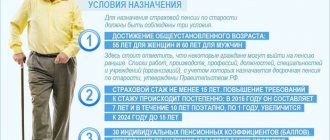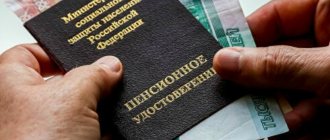- home
- Reference
- Finance
In the Russian Federation, there is a legally established procedure for collecting debts from citizens, including pension recipients.
Collections are carried out by the FSSP, which acts based on court decisions . At the same time, the law provides for restrictions on deductions from pensions in favor of third parties.
Does a bailiff have the right to seize a pension?
Previously, the answer to the question whether bailiffs can calculate debt from pensions was unequivocal: yes, they can. True, with certain restrictions: an amount in an amount not exceeding 50% of the receipt of funds . In some cases, this figure could be increased to 70% - if, for example, the debtor must additionally compensate for damage to health or moral damage.
Before the new law prohibiting bailiffs from deducting pensions came into force, the debtor was often left with only the minimum subsistence level from the initial receipt of pension benefits, according to Art. 440 of the Civil Code of the Russian Federation. In addition, the debtor had to prove to law enforcement agencies the intended purpose of the account.
Note: an account can be considered a target account only if it was opened for the purpose of receiving any social benefits. If you opened an account “for education”, “for buying a car”, etc., this will not be considered opening a target account.
Previously, it was possible to repay the amount of debt from pension payments. This right was enshrined in Federal Law No. 229-FZ of October 2, 2007 On Enforcement Proceedings .
Now there is a whole range of payments and benefits from which bailiffs do not have the right to collect. This will happen if the corresponding bill is adopted by the State Duma.
Validity periods of various documents
When distributing each sum of money collected from the debtor, the claims of each subsequent queue are satisfied after the requirements of the previous queue are satisfied in full. The debtor has the right to go to court to challenge the collection if it is too burdensome. He sends to the authority an application to establish an installment plan or a request to defer repayment. Judicial authorities often accommodate such requests, but do not relieve the debtor of his obligations.
This is important to know: Claim procedure for collecting penalties
What types of pensions cannot be seized?
Key changes in this area occurred with the initiation of a bill, which is popularly known as the “law prohibiting withdrawal of money from pensions.”
Please note: this bill has not yet been passed. It just recently passed the second reading in the State Duma, the third reading is yet to come. Thus, it is too early to say that this law has been adopted - it must undergo a third reading, after which it will either come into force, be rejected, or come into force with amendments.
If this bill is actually adopted, bailiffs will no longer be able to collect funds to pay debts on loans and housing and communal services, if these funds come as:
- Certificate for maternity capital (after its use in a particular institution);
- Alimony;
- Child benefit;
- Funeral benefit;
- Financial compensation for causing harm to health;
- Pension for the loss of a breadwinner. The inclusion of long-service pensions in this list is also being discussed;
- Social benefits for persons caring for disabled people.
What can be the basis for arresting a pension?
Although at the moment it is too early to say that bailiffs will be prohibited from seizing funds from pensions, the bill still has a great chance of passing the third reading.
And it provides not only instructions regarding which payments are prohibited from being collected. It also contains regulations regarding the grounds for seizure of social payments (benefits, alimony, pensions, etc.):
- If the borrower does not pay at least the interest on the loan for a long time;
- If there are debts to pay alimony;
- If the debtor has unpaid utility bills.
In this case, the decision to initiate enforcement proceedings is made exclusively by a court - district, magistrate or arbitration. Even if the pension is seized, the bailiffs still do not have the right to completely seize the funds - the amount of the seized funds is always set in relation to the total amount of the debt.
Is it possible to reduce the retention amount?
Of course it is possible. But this requires documentary evidence of the need for such an action. The reason for reducing payments may be a difficult situation when a person has no other income other than a pension. Also a compelling argument is the presence of dependents, in particular disabled people or minor children in the care of the borrower.
In any case, to reduce the monthly collection of funds from the account, you must write an application to:
- bailiff service,
- Pension Fund,
- court.
In this way, you can reduce the withdrawal of money to 25–30% of the amount received.
How much can bailiffs deduct from pensions?
Here you need to immediately clarify:
- If the client does not notify the bailiffs about the purpose of the account, they may completely block the pension card or pension account. Thus, absolutely all funds will be spent on enforcement proceedings;
- If the client notifies the bailiffs, the amount can be significantly reduced.
Notification of the assignment of the account must be submitted to the bailiffs in writing. You need to document that it is to this account that the social payments you need are received. If this is not done, the maximum retention percentage will be 100%.
The Federal Law “On Enforcement Proceedings” answers the question of what part of the pension can be retained by bailiffs after confirmed notification of the intended purpose of the account. This is no more than 50% of incoming funds .
If, after deducting 50%, the amount remaining is less than the subsistence level in the region of the debtor’s permanent residence, part of this amount is returned to the debtor’s account. Thus, depending on the size of the pension, collection can be made in the amount of 0-50% of the initially received funds.
If the debtor caused health damage and/or moral damage to the plaintiff, bailiffs have the right to seize up to 70% of the pension.
Debt collection from a pensioner
If the person who has assumed a financial obligation refuses to fulfill it, the amounts due to the beneficiary are collected from him in court. Pensions also become a source of compensation for damages. Deductions are made according to a court decision, a document from the Pension Fund (if there is an overpayment of pension, a recalculation must be made, the person has provided inaccurate data) or according to writs of execution. In the latter case, debts on loans, unpaid utilities, and alimony are collected.
Collection is carried out by the Bailiff Service through its territorial offices. Its actions are based on and regulated by legislative norms No. 229-FZ “On Enforcement Proceedings”. According to it, deduction is carried out only after a court decision has been sent to the pensioner’s address. The document states that enforcement proceedings have been initiated, and the person must make a decision - he will voluntarily repay the debt or official compulsory actions of the Service will be used.
It is possible to collect debts from pensioners, and the bailiffs independently decide on the procedure and the assets from which the amounts will be repaid. However, the representative of the law acts exclusively within the legal framework. Thus, withholding a debt from a labor pension is allowed only if the decision was made by the pension authority or the court, which considered the debtor’s actions to be abuse. Payments are made according to the following executive documents:
- sheets issued by general courts or arbitration based on the acts adopted by them;
- decisions made by the Pension Fund (as a rule, if the person was overpaid with a pension);
- court order;
- acts (courts, official bodies) on cases concerning violations of an administrative nature;
- resolutions adopted by bailiffs;
- agreements on the payment of alimony (originals or copies certified by a notary);
- certificates drawn up by labor dispute commissions;
- acts drawn up by control authorities and relating to debt collection with notes from banking and credit institutions in which the person’s funds are placed about the lack of money to compensate for the debt;
- acts of other authorities in cases specified by law.
The plaintiff has the right to collect the debt from the pension if the court has made a corresponding decision and issued a writ of execution - for example, in case of non-payment of a loan. The procedure is also carried out through bailiffs, who act in accordance with current legislation.
Withholding on sheets and other documents is allowed no more than 50% of monthly pension income (in the case of alimony or compensation for damage due to a crime, up to 70%). However, there is a nuance: after collection, the amount remaining must be no less than the subsistence minimum established in the region in which the debtor is registered. Otherwise, the pensioner has the right to appeal the decision. Also, a person who has taken out a loan from a bank, has other debts, but is in a difficult financial situation, can send the bailiffs a request to reduce write-offs, attaching supporting and other documents (certificates of disability, receipts for the purchase of medicines, and so on).
Debt collection in the event of the death of the pensioner on whom it is imposed is considered separately. Obligations pass to the heirs of the person, but only if they accept the inheritance and all encumbrances “attached” to it.
What to do if the bailiffs seized your pension?
Of course, the new bill implies that pensioners will be protected from bailiffs. But to get such opportunities, the pensioner himself will also have to work hard. The simplest action to take is to send an alert. This already saves the pension from complete seizure, leaving the debtor with at least 50% of the originally received benefits.
Any enforcement proceedings begin with a court decision. Take the order issued by the court in your case and study it carefully. Find out in this document how much funds should be withdrawn from you, as well as who exactly is involved in your production. If the document does not indicate information about the persons involved in your case, information on this issue can be found on the website of the FSSP (Federal Bailiff Service).
Next, the bailiff will send the debtor a notice of the commencement of enforcement proceedings. At this moment, the debtor has the right to notify the FSSP employee that he wishes to voluntarily repay the debt within the agreed period. If the debtor does this, he will have the opportunity to defer payments, achieve debt restructuring, installment payments, and also reduce the amount of the monthly payment in exchange for increasing the duration of proceedings.
Just after receiving such a notification, you need to send an application to the FSSP employee with a request not to completely withdraw funds from the pension account. Indicate the details of your pension account in the document and attach documentary evidence of the intended purpose of the account. For example, a copy of a pension certificate, an account statement indicating the sender of funds, etc. can serve in this capacity.
From this moment on, the bailiff will not confiscate the entire incoming pension, but only a part - from 0% to 70%, depending on the size of the pension (0% is possible for a pension equal to or less than the subsistence level in the region of residence).
Results
To summarize, it should be noted that, most likely, in the future, bailiffs will not be able to write off certain types of pensions from citizens’ accounts.
If we are talking about old-age pensions, then the law says that you can deduct up to 50% of your income. But, as judicial practice shows, if citizens are in a difficult financial situation and, after write-offs, they are left with an amount below the subsistence level, then they can demand a reduction in the amount of deductions. If the bailiff is not ready to fulfill the citizen’s request, then the latter should go to court. The stories we shared above show that it is quite possible to achieve justice in this matter.
How to protect your pension from bailiffs?
So, in the last paragraph we have already explained that it is very important to send the bailiff a notice of the assignment of your pension account. Be sure to indicate that your pension is your only source of income. Otherwise, the bailiff may seize the benefits, believing that you have other income.
Please attach an account statement to your application, which will be stamped by the bank and signed by an authorized bank employee. If you do everything correctly, the bailiff, according to the law, will issue a decree to reduce the amount collected from the debtor’s special account. The reduction will be made by 30-100% depending on the size of the pension.
Attention: if the debtor has dependent children or incapacitated relatives, he will almost certainly receive a seizure of his pension in the amount of no more than 30% of the benefits received.
What to do if bailiffs continue to confiscate 100% of your pension?
If the notice was ignored and 100% of the pension is still withheld, the pensioner needs to complain either to the Chief Bailiff of the FSSP or to the prosecutor's office. If the complaint is sent to the FSSP, then it should be addressed to the bailiff who exercises direct control over the employees collecting funds from the debtor. Documents confirming the purpose of your account must be attached to your complaint.
Based on debt collection practice, such complaints are almost always satisfied. Exceptions are possible only if the debtor has “disclosed” his income in addition to the pension - for example, income from unofficial/official work, part-time work, regular financial assistance from children, etc.
Therefore, before filing a claim or complaint, you should carefully check whether the documentation you provide contains any information about additional income. Bailiffs must think that your pension is your only source of income, otherwise it will be very difficult to achieve a reduction in payment.
Amount of deduction from pension according to writ of execution
If, according to a court decision, the amount of debt must be withheld from income, it is usually collected monthly, based on the documents of the body providing pensions. After receiving the writ of execution, the territorial department of the Pension Fund enters into the database information about it, the recipient of the withheld amounts and bank details for receiving the debt.
The conditions for performing this operation, the rules for carrying out registration, and information about the main key points of such procedures are given.
For conscientious payers who find themselves in a difficult situation, the competent authorities, as a rule, meet halfway and help reduce the payment amount.
The amount of deduction from wages and other income of the debtor, including from remuneration to the authors of the results of intellectual activity, is calculated from the amount remaining after withholding taxes.










